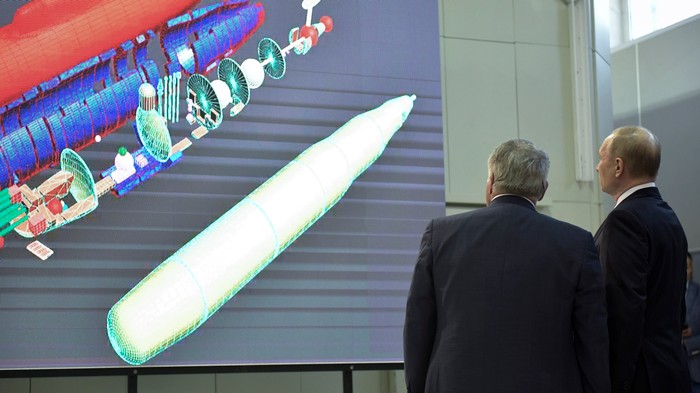On July 13, 2015 the Wall Street Journal published an op-ed entitled The Fading U.S. Nuclear Deterrent by Robert Monroe, a retired Navy vice admiral and former director of the Defense Nuclear Agency. The op-ed’s byline is “The next president must restore America’s aging arsenal to face a world of new atomic threats.” Among other things Monroe argues for “an entirely new nuclear-weapons stockpile, including specialized low-yield advanced weapons” and that “military force must be used if necessary” to prevent others from acquiring nuclear weapons.
Jim Doyle submitted the following to The Wall Street Journal seeking to challenge the op-ed’s inaccuracies, which the Journal rejected. Jim is the nonproliferation expert fired by the Los Alamos Lab after writing a study arguing for nuclear weapons abolition. He is also a crucial member of Nuclear Watch New Mexico’s Steering Committee.
Response to the Inaccurate Wall St. Journal Op-Ed “The Faded U.S. Nuclear Deterrent”
“The Fading U.S. Nuclear Deterrent,” By Robert R. Monroe is loaded with factual inaccuracies and bad advice for America’s national security policymakers. As a consequence, Mr. Monroe’s essay is political theater, void of any logical strategic thinking. Unfortunately, Mr. Monroe targets a vulnerability we all share – fear. But America should not scare itself into making bad decisions with our finite national defense resources.
Now and for the foreseeable future our nuclear forces are in no danger of failing to provide deterrence against nuclear attack. Increasingly however, the United States and its allies face a growing panoply of threats including radical Islam, cyber attacks and the consequences of environmental degradation that are immune to nuclear firepower. US national security strategy must make balanced investments in defensive capabilities that can address the full spectrum of threats. Contrary to what Mr. Monroe advocates, defense investments based on a nostalgic preoccupation with the meaningless concept of “nuclear superiority” will weaken America over time and increase our vulnerability to the most likely threats.
Mr. Monroe claims that the “U.S. began a debilitating nuclear freeze” at the end of the Cold War. This is pure disinformation. During the 20 years from 1990-2010 the US completed deployment of the Trident II submarine-launched ballistic missile and the B-2 stealth strategic nuclear bomber and rebuilt the entire Minuteman III land-based nuclear missile force. Additional upgrades to nuclear command and control and warhead accuracy provided the US with the world’s most capable nuclear force. It remains that way today.
During this same timeframe Russia’s nuclear capabilities declined precipitously. By 2006, it had 55 percent fewer intercontinental ballistic missiles, 39 percent fewer strategic bombers, and 80 percent fewer ballistic-missile submarines compared to 1990. The Russian nuclear arsenal continued its decline until approximately 2010 when its nuclear modernization programs began to come on line and initiate restoration of nuclear capabilities that had been maintained by the Soviet Union. China’s nuclear forces with fewer than 250 deployed nuclear warheads remain small compared to the US and Russia which each possess more than 1,500 deployed warheads.
Ironically, nuclear superiority over the last 25 years has not provided America with the strategic advantages implied by Mr. Monroe. Nuclear weapons did not help secure any meaningful victory in Iraq, Afghanistan, Libya, or Syria, did not prevent the rise of Al Qaida, ISIS and Boko Harem or deter Russia’s actions in Georgia and Ukraine. Nuclear weapons did not check China’s assertiveness in the South China Sea, or thwart the DPRK’s acquisition and testing of nuclear weapons. Nuclear weapons cannot give their possessors the ability to prevent or defeat these threats. Other non-nuclear military, diplomatic and strategic capabilities are required.
Mr. Monroe urges us to dismiss President Obama’s goal of a world without nuclear weapons as an “impossible vision” that is “terribly damaging” to America. Perhaps he is comfortable with successive generations of Americans living with the threat of nuclear holocaust for time immemorial. Fortunately, he is in a minority that believes nuclear deterrence can work forever without fail. Science and rationality tell us it cannot.
The most alarming of Mr. Monroe’s fantasies is his description of nuclear deterrence: “You threaten your adversary with intolerable consequences if he does not comply with your demands. Then, through reinforcing actions, you convince him that you have the will and capability to carry out your threat.” Your threat, of course is mutual nuclear suicide. These sound like the delusions of General Jack Ripper from the film Dr. Strangelove, or the motto of so many failed empires that have tried to rule the world.
Mr. Monroe also claims “for the past two decades nuclear deterrence has been missing from the U.S. toolbox.” Bullocks. Nuclear deterrence is a condition that obtains when any nation has the ability to threaten nuclear attack or devastating nuclear retaliation. It has never been absent from US strategy since the deployment of nuclear weapons in 1945. The delusion to which Mr. Monroe ascribes is that nuclear weapons somehow allow us to reliably influence the decisions of our adversaries. They can never provide this capability.
Mr. Monroe advocates the production and testing of “an entirely new nuclear-weapons stockpile, including specialized low-yield advanced weapons.” Such a course of action will not give America the ability to achieve the outcomes it desires in the world. It will most likely encourage other nations to accelerate plans to increase their nuclear arsenals and acquire similar capabilities as some are now doing.
America’s nuclear deterrent is not rusting away but as former US statesmen Schultz, Kissinger, Perry and Nunn have repeatedly warned in these pages “nuclear deterrence is becoming decreasingly effective and increasingly hazardous.” For now American must and is maintaining a more-than-sufficient nuclear deterrent. But developing and testing new types of nuclear bombs and engaging in a new nuclear arms race will not make that deterrent more effective against the full range of threats nor less hazardous. The world’s nuclear weapons addiction leads only to disaster. America, with it partners and allies, needs to lead the way to a better system for international stability and development.
James E. Doyle

